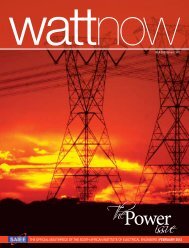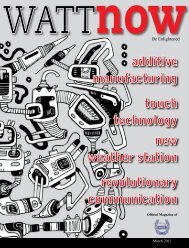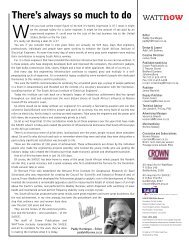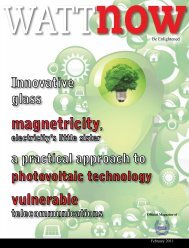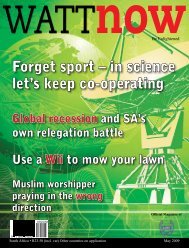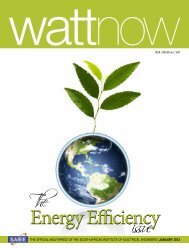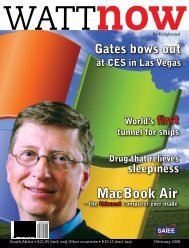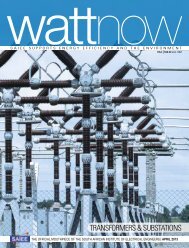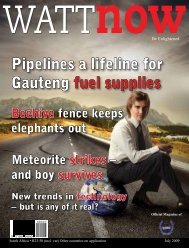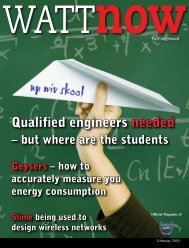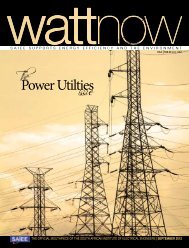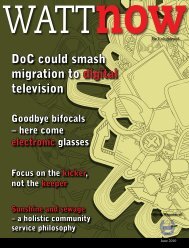Cut electricity consumption with automation - Watt Now Magazine
Cut electricity consumption with automation - Watt Now Magazine
Cut electricity consumption with automation - Watt Now Magazine
You also want an ePaper? Increase the reach of your titles
YUMPU automatically turns print PDFs into web optimized ePapers that Google loves.
Department Illinois Institute of Technology in Chicago, Illinois USA.<br />
He is past director of the Electric Power and Power Electronics<br />
Center at Illinois Institute of Technology (IIT) and is author of 300<br />
technical papers and four books on electric power systems planning,<br />
operation, and control.<br />
He is the recipient of 2005 IEEE/PES Best Transactions Paper<br />
Award, 2004 IEEE/PSO Best Transactions Paper Award, Edison<br />
Electric Institute’s Outstanding Faculty Award, HKN’s Outstanding<br />
Young Electrical Engineering Award, Sigma Xi’s Outstanding<br />
Researcher Award, IIT’s Outstanding Faculty Award, and University<br />
of Michigan’s Outstanding Teaching Award. He is the past president<br />
of National Electrical Engineering Honor Society, and serves as the<br />
Editor of the IEEE Transactions on Power Systems.<br />
Dr. Shahidehpour has lectured across the globe on <strong>electricity</strong><br />
restructuring issues and has been a visiting professor at several<br />
universities. He is an editor of IEEE Transaction on Power Systems,<br />
Chair of the Power System Operation Committee of IEEE. Finally<br />
he was key note speaker at a power conference held in Cape Town on<br />
May 28-30 2008.<br />
Prof. Shahidehpour’s summary of his lecture is as follows: “The<br />
presentation reviews the impact of distributed generation on power<br />
system restructuring and the essence of competition in the operation<br />
and the planning of electric power systems. The electric power system<br />
operation is rapidly becoming market-driven in which generation,<br />
transmission, and distribution companies strive to maximize their<br />
respective revenues in a highly competitive environment. In a<br />
competitive <strong>electricity</strong> market, Independent System Operators (ISOs)<br />
coordinate power system operation constraints <strong>with</strong> <strong>electricity</strong> market<br />
participants for satisfying hourly load demand, energy constraints,<br />
limited availability of fossil fuel and water resources, environmental<br />
constraints, and transmission security requirements. However, because<br />
of the increasingly intimate role that the <strong>electricity</strong> plays in the<br />
national economy, security remains to be the most important aspect<br />
of power system operation which cannot be compromised in a marketdriven<br />
approach. The presentation discusses assumptions, functions,<br />
and calculation tools that are essential for satisfying power systems<br />
security requirements. The presentation elaborates on the impact of<br />
distributed generation on the security and economics of restructured<br />
power systems. The presentation concludes that global analyses of<br />
security options provide additional opportunities for seeking optimal<br />
and feasible schedules in competitive <strong>electricity</strong> markets.”<br />
In view of the recent load shedding that has been experienced in<br />
South Africa, it was most interesting to hear about the experiences<br />
of the American system in regard to “Rolling Blackouts” <strong>with</strong> details<br />
of the causes and results of these problems. Some of the professor’s<br />
slides showed interesting night-time satellite images of the USA<br />
during blackouts. The lecture will be repeated in Cape Town and it is<br />
hoped that those responsible for the South African <strong>electricity</strong> systems<br />
will learn from the American experience. The picture shows (L to R<br />
) the President of the SAIEE Victor Wilson, Prof Shahidehpour and<br />
Prof Willie Cronje the representative of the IEEE.<br />
From the President’s Pen<br />
We congratulate<br />
Andries Tshabalala<br />
on his election<br />
as a Vice President<br />
of the SAIEE and welcome him as<br />
an Office Bearer. Andries is an active<br />
participant in Council and its<br />
committees and the Institute is fortunate<br />
to have him in a leadership<br />
position.<br />
The Western Cape Centre has begun a programme of introducing<br />
school learners to Electrical Engineering as a career. The events take<br />
place at the MTN Sciencentre and include meeting young Engineers,<br />
a question and answer session, and building a working (in most<br />
cases) electric motor.<br />
Initiatives such as this and the continuing tutoring and science<br />
activities at schools in KwaZulu-Natal are an excellent way for the<br />
SAIEE and its members to be relevant to the community and I thank<br />
those who give of their time.<br />
Council members represent the Institute at various meetings, workshops,<br />
and conferences. A number of these, not surprisingly, deal <strong>with</strong><br />
the <strong>electricity</strong> crisis. Many of the meetings give us the opportunity to<br />
present the Engineering facts and point of view to senior businessmen,<br />
government officials, and politicians. Education and skills development<br />
continue to come to the fore in such discussions.<br />
Please use the forum on our website www.saiee.org.za to follow<br />
and add to the discussions there. The forum is where current topics<br />
can be debated while we are still working on submissions on legislative,<br />
regulatory, or standards initiatives. There are also forums for<br />
less serious chatter. Remember that Institute members get access to<br />
additional topics not on the public page.<br />
Members in Mpumalanga and the Vaal triangle are encouraged to<br />
make contact <strong>with</strong> and participate in the activites of the newly formed<br />
Centres there. The face to face interaction facilitated by the Centre<br />
committees is one of the significant benefits of Institute membership<br />
and I thank the committees for their enthusiasm.<br />
Keep an eye on the website for upcoming events.<br />
July 2008<br />
40



